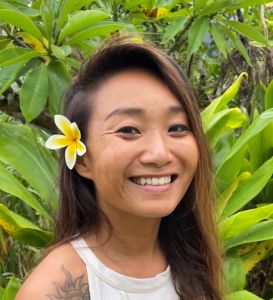
Division of Aquatic Resources
1151 Punchbowl Street, Room 330
Honolulu, HI 96813
After completing her BS in Marine Biology, Anita decided to pursue her MS in Natural Resources and Environmental Management to explore “the other side” of things and understand how management and science work together. Anita’s MS research was focused on evaluating the potential of using an endemic Hawaiian soft coral (Sarcothelia edmondsoni), as a bioindicator of anthropogenic influences. For this study, she conducted benthic transect surveys to track the soft coral populations in Hawai‘i and examined several environmental and anthropogenic factors that may correlate with abundance. Additionally, she conducted a spatial analysis with statewide data to assess relationships and used Geographic Information System (GIS) layers of anthropogenic and land-use datasets to compare and map the soft coral distributions.
Anita worked at the Coral Reef Ecology Laboratory at the Hawai‘i Institute of Marine Biology as a lab manager for five years prior to becoming a Gordon Grau fellow in 2021. During that time, she was involved in many seminal research projects examining the effects of climate change on coral reefs, and was heavily involved in fieldwork and monitoring around the Hawaiian Islands. She has also collaborated and worked with many different agencies and organizations such as The Nature Conservancy, National Park Service, and the Division of Aquatic Resources (DAR). While she enjoys fieldwork and loves to be in the water, Anita is excited to start a new journey as a Grau Fellow working with the DAR Holomua: Marine 30×30 team. She will be assisting with planning efforts, interfacing with various communities and stakeholders, aiding in the development of monitoring strategies, and creating public communication materials. Anita is looking forward to bridging the gap between science, management, and local communities, and hopes to improve communication and trust between all parties and stakeholders to aid in effective management of our nearshore marine resources while recognizing and respecting indigenous communities and cultural values.

